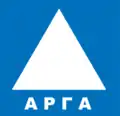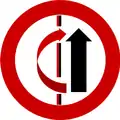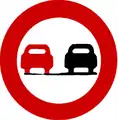Road signs in Greece
Road signs in Greece are regulated by the Ministry of Transport and the Hellenic Traffic Police, according to the Greek Highway Code.
Signs follow the general European conventions concerning the use of shape and colour, for every sign category. Signs indicating dangers are triangular with a red border, those giving orders are almost all circular (white on blue for mandatory instructions, black on white with a red border for prohibitions), and those providing information are rectangular. Most signs use pictograms to convey their particular meaning.
As is customary in European countries, all signs are partly or fully reflectorized or are provided with their own night-time illumination. Signs used for temporary regulations may have a yellow background colour.
Greek road signs depict people with realistic (as opposed to stylized) silhouettes. All signs are identified by a Greek capital letter (for each category) and a number. Signs that indicate the same meaning but in a different direction have the same capital letter and number but are additionally differentiated by a lowercase letter (e.g., α, β, γ, δ, ... or α for left and δ for right).
History
_from_the_Roman_road_that_ran_through_Boeotia._2nd_cent._B.C.jpg.webp)
The history of road signaling in Greece dates back to Antiquity. The first road signaling included marble columns with the head of Hermes, protector of the wayfarers. Those signs were known known as ἑρμαῖ ("Hermai").[1] There were also milestones for measuring street length in stadions.[2] Similar columns were also used in Roman times, but had miles as a unit of measurement.
The first road signage on Greek roads with contemporary signs was made in 1924 by ELPA (Elliniki Leschi Periigiseon kai Aftokinitou, lit. translated: Hellenic Club of Tours and Car),[3] which took over the road network's signage until 1957, when it was taken over by the state.[4] The signs were subject to the provisions of the Geneva Protocol on Road Signs and Signals.
On July 25, 1962, and with Government Gazette A '110/62, it was announced in paragraph 1 of Article 14 that "by joint decisions, issued by the Ministers of Transport, Public Works and Interior, all matters relating to the road signs, road markings, the type of signals, the characteristics of the road signage and the manner of its application shall be defined," while in paragraph 2 of the same article that "the provisions of the International Geneva Protocol on Road Signs and Signals of September 1949, with its supplements, are temporarily valid and up-to the apply of the referenced of the paragraph 1 of this Article."
Finally, on July 6, 1974, 12 years after the initial announcements and with the Government Gazette B '676/74, the first serious signaling standards were established, which are still valid today.[5] It was the first time that sign diagrams were included in a Government Gazette. Since the publication of the relevant Government Gazette, the "provisions of paragraph 2 of Article 14 of Law 4332/62 "on the ratification of the Road Trafffic Code" have been abolished. However, within five years of its publication, six of the old signs from the Geneva Protocol were still valid, as "temporarily preserved signs."
The ΠΤΠ (Πρότυπες Τεχνικές Προδιαγραφές – Standard Technical Specifications) Σ301-75, and Σ301-302-75 (ΦΕΚ 99 B '/ 1976) established the quality of the aluminum of the sign, the ΠΤΠ of ΦΕΚ 1061 B' / 1980, as corrected by the order BM5 / 0/40229 / 27-10-1980 the support poles, the ΠΤΠ of the ΦΕΚ 589 / Β / 1980 the signalling of performed intercity road works, the ΠΤΠ of the ΦΕΚ 121 / Β / 1983 the signalling of performed city road works, The ΠΤΠ Σ310 and Σ311 the membranes of the signs, the technical specification ΔΚ8 of ΕΗ3 / 0/107 / 22-1-1976 the poles for eccentric plates and the Greek standard ΕΛΟΤ- 743/87 the conversion of the Greek alphabet into Latin characters for the information signs, the Technical Description Δ3γ / 0/15/11-Ω / 28-2-1991 the illuminated signs, the Directive of ΔΜΕΟε / οικ / 720 / 13-11-92 the issues of road signs that are not covered by the previous specifications, the Community Directives and the corresponding Circulars of the Ministry TEM and the KME and ΤΣΥ the signaling and the types of safety equipment on the motorways and the relevant legislation of the Highway Code for advertisement signs.[1] At the same time, in 1976 and 1981, the Katharevousa and the Polytonic System, respectively, were abolished and replaced by new dialects and writing systems (Dimotiki and Monotonic). The Road Design Studies Instructions (OMOE) for the Motorway Signs and Signals (ΚΣΑ) and for the Marking of Performed Works (ΣΕΕΟ), concern the signs for these issues. (ΦΕΚ 905/2011 / B ') Finally, many recent laws (Mainly laws of the Higway Code), have introduced new signs of various categories, which mainly concern vehicles that appear for the first time (e.g. trams or electric cars).
Design
Fonts
The font on the signs since 1974 is Transport, which also appears on the signs of other European countries. On motorways, the DIN 1451 font is used.
Language
The signs in Greece are in two languages: Greek (Greek Alphabet) and English (Latin Alphabet). Previously, the signs were in Katharevousa and used the Polytonic system, until 1976 and 1981, which were replaced by the Demotic and Monotonic systems respectively.
Retroreflection
Signs during the night are either:
- Internally illuminated – that is, of suitable translucent materials, illuminated by internal illumination systems. The application of these signs is restricted mainly to urban areas and to specific high-risk interurban networks.
- Externally illuminated – that is, they are illuminated by lamps facing them. These signs are applied at places where the light beam of cars is difficult to reach, such as the road sign gantries.
- With reflective materials – that is, part or all of which is of a suitable reflective film. They may not be reflective (at roads that are lit at night), semi-reflective (only symbols are reflective) or fully reflective (except symbols).
Finally, there are fluorescent reflective membranes, used in special circumstances, as a backdrop for school signs or signs indicating significant hazards.
Material
According to ΦΕΚ 99/76 B, the plates are made of aluminum sheets, "of alloy type AIMg 2 according to DIN 1725 Blatt I" or aluminum "type SIC 114 according to BS 873: PART 1: 1970 > 3 mm." To prevent corrosion, "they are calculated with a safety factor in terms of their mechanical strength, above 1.61."[6]
Poles
According to ΦΕΚ 1061 B '/ 1980, the poles οf the signs are metal and are made of steel pipes or pipes made of aluminum alloy. The steel pipes have Carbon (0.17% to 0.30%), Sulfur (0.050% to 0.060%) and Phosphorus (0.050% to 0.060%), while the aluminum pipes, which are made of type 6005-A aluminum alloy according to the French AFNOR specification, silicon (0.60% to 0.90%), iron (0.35% maximum), manganese (0.50% maximum) and magnesium (0.40% to 0.70%) and their height is about 2.50 to 3.30 meters (8.2 to 10.8 ft).[7] The poles are usually made of steel, in the form of hollow beams, or of lightly reinforced concrete in circular sections. Two or more poles can also be used on larger signs.[5]
Dimensions
The signs have the following sizes:[8]
- Small – The circular ones have a diameter of 450 millimeters (18 in), the equilateral triangular sides 600 millimeters (24 in), the informative ones with letters height 100 millimeters (3.9 in) and the octagonal STOP diameter 600 millimeters (24 in). They are found mainly in villages, small towns, private and rural roads, as well as in private areas. They are rarely placed on provincial roads, and if approved by the Competent Service.
- Medium – The circular ones have a diameter of 650 millimeters (26 in), the equilateral triangular sides 600 millimeters (24 in), the informative ones with letters height 100 millimeters (3.9 in) and the octagonal STOP diameter 900 millimeters (35 in). They are found mainly in large cities and on provincial and / or national roads.
- Large – The circular ones have a diameter of 900 millimeters (35 in), the equilateral triangular sides 1,200 millimeters (47 in), the informative ones in letters height 200 millimeters (7.9 in) and the octagonal STOP diameter 1,200 millimeters (47 in). They are found mainly on expressways.
On motorways, the size of the sign and the letters, as well as the font, require special treatment due to the different driving requirements on these roads.[8]
Post-1974 signs
Categorization
They are divided into certain categories based on their meaning, shape and coloring.[9]
- Danger Notice (K Series).
- Traffic Regulatory (Ρ Series).
- Informatory (Π Series).
- Οδοδείκτες (Road-pointers), these are signs with text that guide drivers to the directions they at intersections between roads or warn before they confirm the correctness of the route they follow and inform them of the distances from their destination.
- Other informatory signs, are signs that contain pictograms that inform drivers of the existence of a specific installation or service in the course of their journey.
The color of the letters is yellow, in Greek and white in Latin. Background color indicates the kind of direction. These colors are:
- Green for Motorways
- Blue for expressways, etc.
- Brown for tourist routes
- White (with black letters) inside populated areas or facilities in them.
- Additional (Πρ series). These signs are rectangular with a black border on a white background with a black pictogram and are always combined with other road signs. They are designed to:
- Make the message displayed clearer
- Specify the displayed message
Additional signs are never used by themselves.
Danger notice signs (K series)
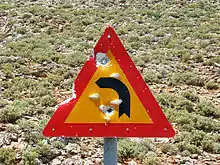
The K series includes the warning signs. These signs have mostly triangular shape (except for K-33 to K-37). Their borders are red and their background is yellow (With the exception of K-21, where it's white) and the pictograms are black. They are intended to alert drivers early on of risks, which they can find in their course (e.g. dangerous places, accesses of road junctions, accesses of railway level crossings, etc.) in order to take the appropriate measures in time (e.g. reduction of speed) In total, there are 50 such signs, numbered K-1a, K-1d, K-2a, K-2d, K-3 to K-5, K-6a, K-6d, K-7 to K-27, K -28a, K-28d, K-29a, K-29d, K-30 to K-37, K-38a, K-38d and K-39 to K-44
| Diagram | Number | Meaning | Law of establishment | Ref. | Notes |
|---|---|---|---|---|---|
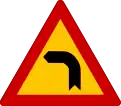 |
Κ-1α | Dangerous left turn | ΦΕΚ Β' 676/74 | ||
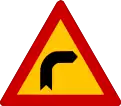 |
Κ-1δ | Dangerous right turn | ΦΕΚ Β' 676/74 | ||
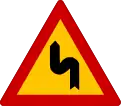 |
Κ-2α | Dangerous two opposite or continuous turns, the first one to the left | ΦΕΚ Β' 676/74 | ||
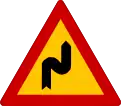 |
Κ-2δ | Dangerous two opposite or continuous turns, the first one to the right | ΦΕΚ Β' 676/74 | ||
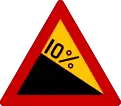 |
Κ-3 | Dangerous hill downwards (With slope as indicated on the sign) | ΦΕΚ Β' 676/74 | ||
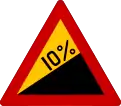 |
Κ-4 | Dangerous hill upwards (With slope as indicated on the sign) | ΦΕΚ Β' 676/74 | ||
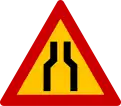 |
Κ-5 | Dangerous pavement narrowing on both sides | ΦΕΚ Β' 676/74 | ||
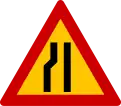 |
K-6α | Dangerous pavement narrowing on the left side | ΦΕΚ Β' 676/74 | ||
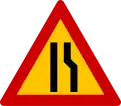 |
K-6δ | Dangerous pavement narrowing on the right side | ΦΕΚ Β' 676/74 | ||
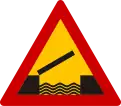 |
Κ-7 | Moveable bridge | ΦΕΚ Β' 676/74 | ||
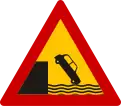 |
K-8 | The road leads to a dock or river bank | ΦΕΚ Β' 676/74 | ||
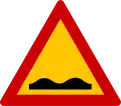 |
K-9 | Dangerous bumpy pavement in bad condition, with pits, etc. | ΦΕΚ Β' 676/74 | ||
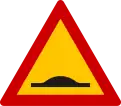 |
K-10 | Dangerous elevated pavement or steep curvy change of the lengthwise slope of the road | ΦΕΚ Β' 676/74 | ||
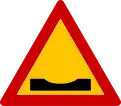 |
K-11 | Dangerous vertical gutter or steep hollow change of the lengthwise slope of the road | ΦΕΚ Β' 676/74 | ||
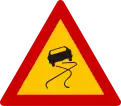 |
K-12 | Slippery pavement | ΦΕΚ Β' 676/74 | ||
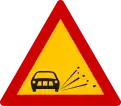 |
K-13 | Dangerous gravel ejection (loose chippings) | ΦΕΚ Β' 676/74 | ||
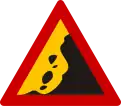 |
K-14 | Danger of falling rocks and their presence in the pavement | ΦΕΚ Β' 676/74 | ||
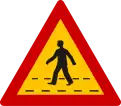 |
K-15 | Danger due to pedestrian crossing | ΦΕΚ Β' 676/74 | ||
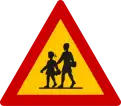 |
K-16 | Danger due to often children traffic (schools, stadiums, etc.) | ΦΕΚ Β' 676/74 | ||
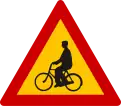 |
K-17 | Danger due to often entrance of cyclists, or cyclist crossing | ΦΕΚ Β' 676/74 | ||
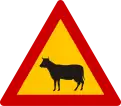 |
K-18 | Danger of domesticated animal crossing | ΦΕΚ Β' 676/74 | ||
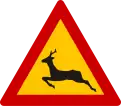 |
K-19 | Danger of wild animal crossing | ΦΕΚ Β' 676/74 | ||
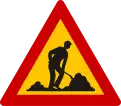 |
K-20 | Danger due to performed roadworks | ΦΕΚ Β' 676/74 | ||
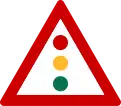 |
K-21 | Attention, intersection or position where traffic is regulated by three-colored traffic lights. | ΦΕΚ Β' 676/74 | ||
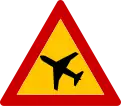 |
K-22 | Danger due to low flights of taking-off or landing aircraft | ΦΕΚ Β' 676/74 | ||
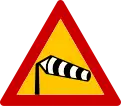 |
K-23α | Danger due to often strong wind (As the direction of the windsock shows) | ΦΕΚ Β' 676/74 | ||
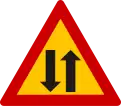 |
K-24 | Αdvance notice of a two-way traffic | ΦΕΚ Β' 676/74 | This sign means imminent entrance from a one-way road or part of a road that includes two decks separated by direction by a median strip, in a part of a road with traffic on the same pavement in both directions, temporarily or permanently. | |
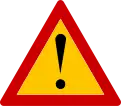 |
K-25 | Attention, other dangers (not indicated on former signs) | ΦΕΚ Β' 676/74 | ||
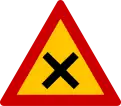 |
K-26 | Attention, junction where the priority from right is valid | ΦΕΚ Β' 676/74 | ||
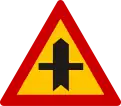 |
K-27 | 4-way intersection, with a road, on which drivers have to give priority | ΦΕΚ Β' 676/74 | ||
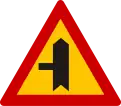 |
K-28α | 3-way intersection with a verctical road on the left, on which drivers have to give priority | ΦΕΚ Β' 676/74 | ||
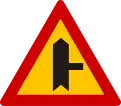 |
K-28δ | 3-way intersection with a verctical road on the right, on which drivers have to give priority | ΦΕΚ Β' 676/74 | ||
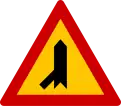 |
K-29α | 3-way intersection with an oblique road on the left, on which drivers have to give priority | ΦΕΚ Β' 676/74 | ||
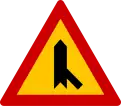 |
K-29δ | 3-way intersection with an oblique road on the left, on which drivers have to give priority | ΦΕΚ Β' 676/74 | ||
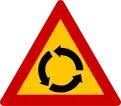 |
K-30 | Approach to a circular mandatory route | ΦΕΚ Β' 676/74 | ||
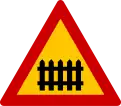 |
K-31 | Danger due to railway level crossing with moving barriers or tram crossing | ΦΕΚ Β' 676/74 | The "or tram crossing" phrase, was added in 2004, with ΦΕΚ Α’137/22-7-2004, due to the Athens Tram opening. | |
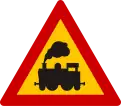 |
K-32 | Danger due to railway level crossing without moving barriers | ΦΕΚ Β' 676/74 | ||
 |
K-33, K- 34, K-35 | Additional repeative signs at accesses of railway level crossings or moveable bridges, which indicate approach at them. | ΦΕΚ Β' 676/74 | ||
 |
K-36 | Danger due to immediate vicinity of a railway level crossing, without moving barriers, of a single-track railway or a tramway crossing | ΦΕΚ Β' 676/74 | The "or tram crossing" phrase, was added in 2004, with ΦΕΚ Α’137/22-7-2004, due to the Athens Tram opening. | |
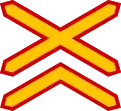 |
K-37 | Danger due to immediate vicinity of a railway level crossing, without moving barriers, of dual or multiple railway track or a tramway crossing | ΦΕΚ Β' 676/74 | The "or tram crossing" phrase, was added in 2004, with ΦΕΚ Α’137/22-7-2004, due to the Athens Tram opening. | |
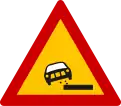 |
K-38α | Dangerous soft verges on the left | ΦΕΚ 182/Α/25-11-1992 | ||
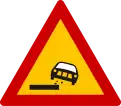 |
K-38δ | Dangerous soft verges on the right | ΦΕΚ 182/Α/25-11-1992 | ||
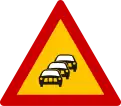 |
K-39 | Often traffic congestion | ΦΕΚ 182/Α/25-11-1992 | ||
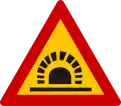 |
K-40 | Tunnel | ΦΕΚ 182/Α/25-11-1992 | ||
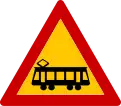 |
Κ-41 | Danger due to tram level crossing without moving barriers | ΦΕΚ Α’137/22-7-2004 | ||
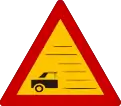 |
K-42 | Danger due to fog | ΦΕΚ Α’22/29-1-2014 | [10] | |
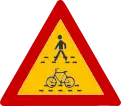 |
Κ-43 | Danger due to parallel pedestrian and cyclist crossings | ΦΕΚ Α’59/30-3-2018 | [11] | |
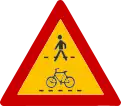 |
Κ-44 | Danger due to common pedestrian and cyclist crossings | ΦΕΚ Α’59/30-3-2018 | [11] |
Source:[12]
| Wikimedia Commons has media related to Road signs in Greece. |
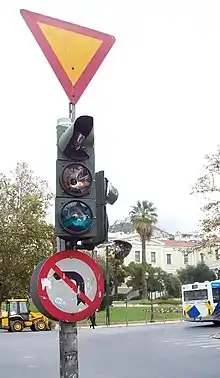
Regulatory signs
The P series of KOK, includes the traffic regulation signs, prohibitive or mandatory, or that concern the priority of the vehicles. These signs are mainly round (Except for P-1 to P-4, P-6, P-43, P-44, P-60, P-61 and P-69 to P-75). Their coloring consists mainly of a black symbol (pictogram) on a white background with a red frame, sometimes with a diagonal line in the middle (which indicates prohibition), when it comes to prohibitions and a white symbol on a blue background, when it comes to mandatory signs. These signs are affixed to inform drivers of obligations, restrictions or prohibitions, and their compliance with them. There are also penalties and fines in case of violation of these signs
In total, there are 87 such signs, numbered P-1 to P-50, P-50a, P-50d, P-51a, P-51d, P-52, P-52a, P-52d, P-53 to P -66, P-66a, P-67, P-67a, P-68, P-68a, P-69 to P-72, P-73a, P-73s, P-74a, P-74s and P-75 to P-77.
| Diagram | Number | Meaning | Law of establishment | Fine | Ref. | notes |
|---|---|---|---|---|---|---|
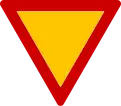 |
Ρ-1 | Mandatory priority concession. (Yield) | ΦΕΚ Β' 676/74 | administrative fine of €700 | This sign means that at the intersection in front of which it is placed, drivers must give priority to vehicles moving on the other road. | |
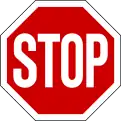 |
Ρ-2 | Mandatory stoppage. (Stop) | ΦΕΚ Β' 676/74 | administrative fine of €700 |
| |
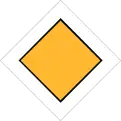 |
Ρ-3 | Priority road | ΦΕΚ Β' 676/74 | administrative fine of €80 | ||
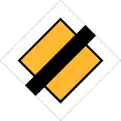 |
Ρ-4 | End of priority road | ΦΕΚ Β' 676/74 | administrative fine of €80 | ||
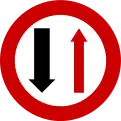 |
Ρ-5 | Priority of the oncoming traffic due to the narrowness of the road | ΦΕΚ Β' 676/74 | administrative fine of €80 | ||
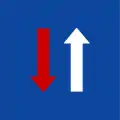 |
Ρ-6 | Priority over oncoming traffic (due to road narrowness) | ΦΕΚ Β' 676/74 | administrative fine of €80 | ||
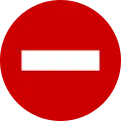 |
Ρ-7 | It is forbidden for all vehicles to enter | ΦΕΚ Β' 676/74 | administrative fine of €200 | ||
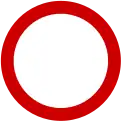 |
Ρ-8 | Closed road for all vehicles in both directions | ΦΕΚ Β' 676/74 | administrative fine of €200 | ||
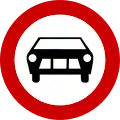 |
Ρ-9 | It is forbidden for motor vehicles other than two-wheeled motorcycles to enter | ΦΕΚ Β' 676/74 | administrative fine of €80 | ||
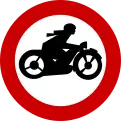 |
Ρ-10 | It is forbidden for motorcycles to enter | ΦΕΚ Β' 676/74 | administrative fine of €80 | ||
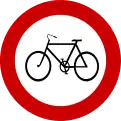 |
Ρ-11 | It is forbidden for the bicycles to enter | ΦΕΚ Β' 676/74 | administrative fine of €80 | ||
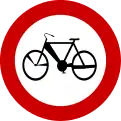 |
Ρ-12 | It is forbidden for mopeds to enter | ΦΕΚ Β' 676/74 | administrative fine of €80 | ||
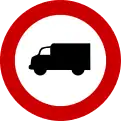 |
Ρ-13 | It is forbidden for trucks to enter | ΦΕΚ Β' 676/74 | administrative fine of €80 | An indication of a tonnage number, either in white on the vehicle's outline or on an additional plate, affixed to the P-13 sign, means that the prohibition applies only if the maximum permissible weight of the vehicle or combination of vehicles exceeds that number. | |
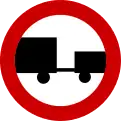 |
Ρ-14 | It is forbidden for a motor vehicle towing a trailer, except for a semi-trailer or a single-axle trailer to enter. | ΦΕΚ Β' 676/74 | administrative fine of €80 | The indication of a tonnage number, either in white on the trailer's outline or on an additional plate, placed under the P-14 sign, means that the prohibition applies only if the maximum permissible weight of the trailer exceeds this number. | |
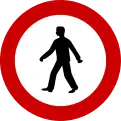 |
Ρ-15 | Pedestrian entry is prohibited | ΦΕΚ Β' 676/74 | administrative fine of €80 | ||
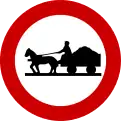 |
Ρ-16 | It is forbidden for animal-drawn vehicles to enter | ΦΕΚ Β' 676/74 | administrative fine of €80 | ||
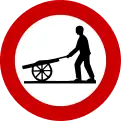 |
Ρ-17 | It is forbidden for handcarts to enter | ΦΕΚ Β' 676/74 | administrative fine of €80 | ||
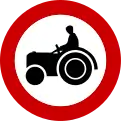 |
Ρ-18 | It is forbidden for agricultural machinery to enter | ΦΕΚ Β' 676/74 | administrative fine of €80 | ||
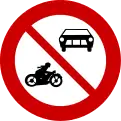 |
Ρ-19 | It is forbidden for motor vehicles to enter | ΦΕΚ Β' 676/74 | administrative fine of €80 | ||
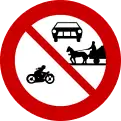 |
Ρ-20 | It is forbidden for vehicles of certain categories (e.g. motor vehicles and animal-drawn) to enter | ΦΕΚ Β' 676/74 | administrative fine of €80 | ||
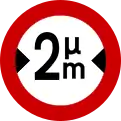 |
Ρ-21 | It is forbidden for vehicles with a total width exceeding (e.g. 2) meters to enter | ΦΕΚ Β' 676/74 | administrative fine of €80 | ||
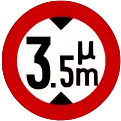 |
Ρ-22 | It is forbidden for vehicles with a total height exceeding (e.g. 3.5) meters to enter | ΦΕΚ Β' 676/74 | administrative fine of €80 | ||
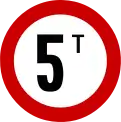 |
Ρ-23 | It is forbidden for vehicles with a total weight exceeding (e.g. 5) tons to enter | ΦΕΚ Β' 676/74 | administrative fine of €80 | ||
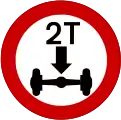 |
Ρ-24 | It is forbidden for vehicles weighing more than (e.g. 2) tons per axle to enter | ΦΕΚ Β' 676/74 | administrative fine of €80 | ||
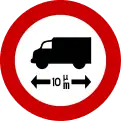 |
Ρ-25 | It is forbidden for vehicles or combinations of vehicles longer than (e.g. 10) meters to enter | ΦΕΚ Β' 676/74 | administrative fine of €80 | ||
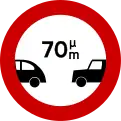 |
Ρ-26 | It is forbidden to drive a vehicle at a distance of less than (e.g. 70) meters from the previous one | ΦΕΚ Β' 676/74 | administrative fine of €80 | ||
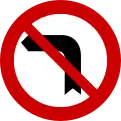 |
Ρ-27 | Left turn is prohibited | ΦΕΚ Β' 676/74 | administrative fine of €200 | ||
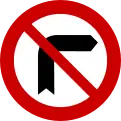 |
Ρ-28 | Right turn is prohibited | ΦΕΚ Β' 676/74 | administrative fine of €200 | ||
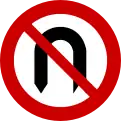 |
Ρ-29 | Reversal (180 degree turn) is prohibited | ΦΕΚ Β' 676/74 | administrative fine of €200 | ||
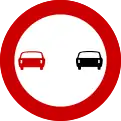 |
Ρ-30 | It is forbidden to overtake motor vehicles, except for two-wheeled motorcycles without a basket | ΦΕΚ Β' 676/74 | administrative fine of €80 | ||
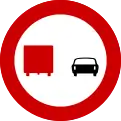 |
Ρ-31 | Truck drivers with a maximum permissible weight exceeding 3.5 tonnes are prohibited from overtaking other vehicles. | ΦΕΚ Β' 676/74 | administrative fine of €80 | An entry on the P-31 sign or an additional plate below the P-31 sign may change the maximum permissible weight above which this prohibition applies. | |
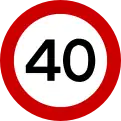 |
Ρ-32 | The maximum speed is limited to the indicated number (e.g. 40 km) per hour. | ΦΕΚ Β' 676/74 | administrative fine of €80 | An indication of a number of tonnes on an additional sign, placed below the P-32 sign, means that the speed limit only applies to vehicles with a total weight exceeding that number. | |
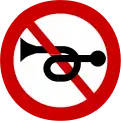 |
Ρ-33 | The use of audible warning devices is prohibited (except to avoid an accident) | ΦΕΚ Β' 676/74 | administrative fine of €80 | ||
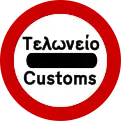 |
Ρ-34 | It is forbidden to cross without stopping in front of the Customs. | ΦΕΚ Β' 676/74 | administrative fine of €80 | ||
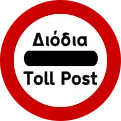 |
Ρ-35 | It is forbidden to cross without stopping in front of the toll station. | ΦΕΚ Β' 676/74 | administrative fine of €80 | ||
 |
Ρ-36 | End of all local bans which have been imposed with prohibition signs on moving vehicles. | ΦΕΚ Β' 676/74 | administrative fine of €80 | ||
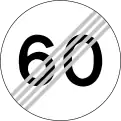 |
Ρ-37 | End of speed limit imposed by a prohibition sign (e.g. 60 km/h) | ΦΕΚ Β' 676/74 | administrative fine of €80 | ||
 |
Ρ-38 | End of overtaking prohibition which has been imposed with a prohibition sign | ΦΕΚ Β' 676/74 | administrative fine of €80 | ||
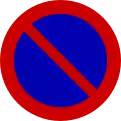 |
Ρ-39 | No parking | ΦΕΚ Β' 676/74 | administrative fine of €40 | ||
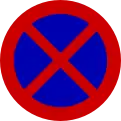 |
Ρ-40 | Stopping and parking is prohibited, unless otherwise specified by an additional plate, etc. | ΦΕΚ Β' 676/74 | administrative fine of €80 | The prohibitions on signs P-39 and P-40 apply from the position of the signs to the next meeting point with the road and on the side of the road on which they are placed. | |
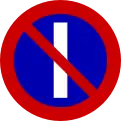 |
Ρ-41 | It is forbidden to park on the side of the sign during the odd months | ΦΕΚ Β' 676/74 | administrative fine of €40 | ||
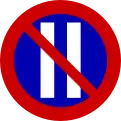 |
Ρ-42 | It is forbidden to park on the side of the sign during the even months | ΦΕΚ Β' 676/74 | administrative fine of €40 | Parking prohibitions and restrictions apply only on the side of the road on which signs P-41 and P-42 are placed. | |
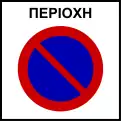 |
Ρ-43 | No parking area (parking for a limited time). | ΦΕΚ Β' 676/74 | administrative fine of €40 | ||
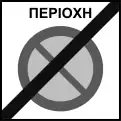 |
Ρ-44 | Exit from a no parking area | ΦΕΚ Β' 676/74 | administrative fine of €80 | ||
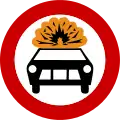 |
Ρ-45 | It is forbidden for vehicles that carry more than a certain amount of explosives or flammable substances to enter | ΦΕΚ Β' 676/74 | administrative fine of €200 | ||
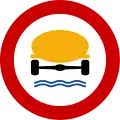 |
Ρ-46 | It is forbidden for vehicles that carry more than a certain amount of substances that can cause water pollution to enter | ΦΕΚ Β' 676/74 | administrative fine of €200 | ||
 |
Ρ-47 | Mandatory left direction | ΦΕΚ Β' 676/74 | administrative fine of €80 | ||
 |
Ρ-48 | Mandatory right direction | ΦΕΚ Β' 676/74 | administrative fine of €80 | ||
 |
Ρ-49 | Mandatory forward direction | ΦΕΚ Β' 676/74 | administrative fine of €80 | ||
 |
Ρ-50 | Mandatory direction by turning left or right | administrative fine of €80 | |||
 |
P-50α | Mandatory direction by turning left | ΦΕΚ Β' 676/74 | administrative fine of €80 | ||
 |
P-50δ | Mandatory direction by turning right | ΦΕΚ Β' 676/74 | administrative fine of €80 | ||
 |
P-51α | Mandatory direction forward or left | ΦΕΚ Β' 676/74 | administrative fine of €80 | ||
 |
P-51δ | Mandatory forward or right direction | ΦΕΚ Β' 676/74 | administrative fine of €80 | ||
 |
P-52 | Mandatory crossing either on the right or on the left side of the median strip or the barrier | ΦΕΚ Β' 676/74 | administrative fine of €80 | ||
 |
P-52α | Mandatory crossing only on the left side of the median strip or barrier | ΦΕΚ Β' 676/74 | administrative fine of €80 | ||
 |
P-52δ | Mandatory crossing only on the right side of the median strip or barrier | ΦΕΚ Β' 676/74 | administrative fine of €80 | ||
 |
P-53 | Circular mandatory route | ΦΕΚ Β' 676/74 | administrative fine of €80 | ||
 |
P-54 | Compulsory bicycle passage road (the passage of other vehicles is prohibited) | ΦΕΚ Β' 676/74 | administrative fine of €80 | ||
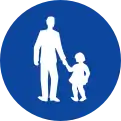 |
P-55 | Compulsory pedestrian passage road (footpath, the passage of other than pedestrians, emergency vehicles and vehicles for entering and exiting in passing properties is prohibited). | ΦΕΚ Β' 676/74 | administrative fine of €80 | ||
 |
P-56 | Compulsory passage of equestrians (the passage of other than equestrians using the road is prohibited) | ΦΕΚ Β' 676/74 | administrative fine of €80 | ||
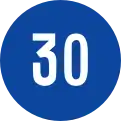 |
P-57 | Mandatory minimum speed indicated by white numbers at (e.g. 30 km) per hour. | ΦΕΚ Β' 676/74 | administrative fine of €80 | This sign means that vehicles using the road, at the entrance of which it is located, must move at a minimum speed (e.g. 30 km) per hour | |
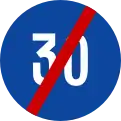 |
P-58 | End of compulsory minimum speed imposed by sign P-57. | ΦΕΚ Β' 676/74 | administrative fine of €80 | ||
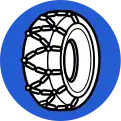 |
P-59 | Mandatory anti-skid snow chains on at least two of the drive wheels of the car | ΦΕΚ Β' 676/74 | administrative fine of €80 | ||
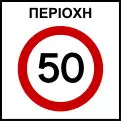 |
P-60 | Maximum speed of an area | ΦΕΚ 182/Α/25-11-1992 | administrative fine of €80 | ||
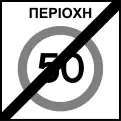 |
P-61 | Exit from area with maximum speed limit (e.g. 50 km/h) | ΦΕΚ 182/Α/25-11-1992 | administrative fine of €80 | ||
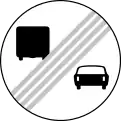 |
P-62 | End of overtaking by trucks ban, which has been imposed with a prohibition sign. | ΦΕΚ 182/Α/25-11-1992 | administrative fine of €80 | ||
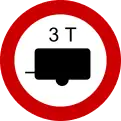 |
P-63 | It is forbidden for the trailer to weigh more than .... (e.g. 3) tons. | ΦΕΚ 182/Α/25-11-1992 | administrative fine of €80 | ||
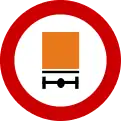 |
P-64 | It is forbidden for vehicles carrying hazardous materials to enter | ΦΕΚ 182/Α/25-11-1992 | administrative fine of €200 | ||
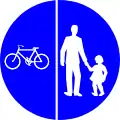 |
P-65 | Each user category that represents the corresponding symbol must use the side of the corresponding path that is specially selected for that category. | ΦΕΚ 182/Α/25-11-1992 | administrative fine of €80 | ||
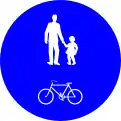 |
P-66 | The various user categories depicted by the corresponding symbols may use the special corridor at the same time. | ΦΕΚ 182/Α/25-11-1992 | administrative fine of €80 | ||
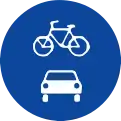 |
Ρ-66α | Mixed use road from vehicles and bicycles | ΦΕΚ 40/Α/4-3-2019 | administrative fine of €80 | [11] | |
 |
P-67 | Exclusive bus or trolley crossing | ΦΕΚ 182/Α/25-11-1992 | administrative fine of €80 | ||
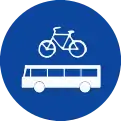 |
Ρ-67α | Exclusive passage of buses, trolleybuses and bicycles | ΦΕΚ 40/Α/4-3-2019 | administrative fine of €80 | [11] | |
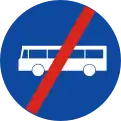 |
P-68 | End of exclusive bus or trolley crossing | ΦΕΚ 182/Α/25-11-1992 | administrative fine of €80 | ||
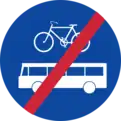 |
Ρ-68α | End of exclusive passage of buses, trolleybuses and bicycles | ΦΕΚ 40/Α/4-3-2019 | administrative fine of €80 | [11] | |
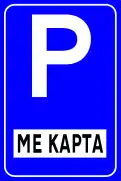 |
P-69 | Controlled parking. | ΦΕΚ 182/Α/25-11-1992 | |||
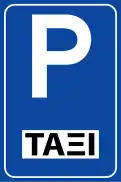 |
P-70 | Parking of a certain category of vehicles e.g. CAB | ΦΕΚ 182/Α/25-11-1992 | administrative fine of €80 | ||
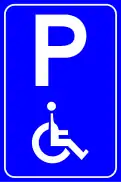 |
P-71 | Parking exclusively for vehicles of Persons with Disabilities, subject to special permit | ΦΕΚ 182/Α/25-11-1992 | |||
.svg.png.webp) |
P-72 | Parking space exclusively for a specific vehicle of Persons with Disabilities, after a special permit and with a registration number ..... | ΦΕΚ 182/Α/25-11-1992 | administrative fine of €200 | ||
| Ρ-73α | Mandatory direction of dangerous goods vehicles to the left | ΦΕΚ Α' 57 /23.3.1999 | administrative fine of €80 | |||
| Ρ-73δ | Mandatory direction of dangerous goods vehicles to the right | ΦΕΚ Α' 57 /23.3.1999 | administrative fine of €80 | |||
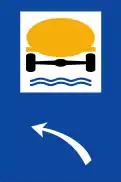 |
Ρ-74α | Mandatory direction of dangerous goods vehicles to the left | ΦΕΚ Α' 57 /23.3.1999 | administrative fine of €80 | ||
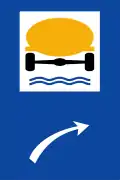 |
Ρ-74δ | Mandatory direction of dangerous goods vehicles to the right | ΦΕΚ Α' 57 /23.3.1999 | administrative fine of €80 | ||
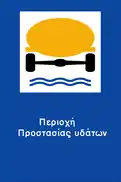 |
Ρ-75 | Imposes special attention to vehicles transporting hazardous materials that can cause water pollution | ΦΕΚ Α' 57 /23.3.1999 | administrative fine of €80 | ||
 |
Ρ-76 | Exclusive tram crossing | ΦΕΚ Α’137/22-7-2004 | administrative fine of €80 | ||
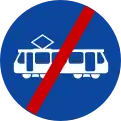 |
Ρ-77 | End of exclusive tram crossing. | ΦΕΚ Α’137/22-7-2004 | administrative fine of €80 |
Informatory signs
- Informatory signs
 E-road numbering
E-road numbering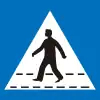 Pedestrian crossing
Pedestrian crossing Hospital
Hospital One-way street ahead
One-way street ahead.svg.png.webp) One-way street
One-way street Dead end ahead on 90 degrees roads
Dead end ahead on 90 degrees roads Dead end ahead on non-90 degrees roads
Dead end ahead on non-90 degrees roads Dead end
Dead end Alternative direction
Alternative direction
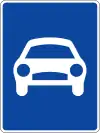 Expressway
Expressway End of expressway
End of expressway Motorway
Motorway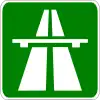 Motorway (alternative)
Motorway (alternative) End of motorway
End of motorway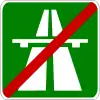 End of motorway (alternative)
End of motorway (alternative) First aid
First aid Workshop
Workshop Telephone
Telephone Petrol station
Petrol station Hotel
Hotel Restaurant
Restaurant Refreshments
Refreshments Picnic site
Picnic site Hiking trail
Hiking trail Caravan site
Caravan site Camping site
Camping site Youth hostel
Youth hostel Information
Information Bathing
Bathing Toilet
Toilet Radio station for road and traffic information
Radio station for road and traffic information Built-up area
Built-up area End of built-up area
End of built-up area Disabled persons
Disabled persons.svg.png.webp) Sharp bend, Right (alternative)
Sharp bend, Right (alternative).svg.png.webp) Sharp bend, Left (alternative)
Sharp bend, Left (alternative) Sharp bend, Right
Sharp bend, Right Sharp bend, Left
Sharp bend, Left Motorway numbering
Motorway numbering National road numbering (used on motorway signs only)
National road numbering (used on motorway signs only) National road numbering (used on every road type but motorways)
National road numbering (used on every road type but motorways) Direction sign in Expressway intersections with two directions
Direction sign in Expressway intersections with two directions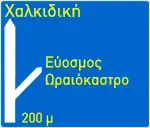 Direction sign in Expressway intersections with one direction
Direction sign in Expressway intersections with one direction Direction sign on usual roads
Direction sign on usual roads Direction sign on roads of local road network
Direction sign on roads of local road network Direction sign on tourist roads
Direction sign on tourist roads Direction sign on tourist roads
Direction sign on tourist roads Direction sign
Direction sign Direction sign
Direction sign Direction sign to Airport
Direction sign to Airport Advance direction sign, diagrammatic type
Advance direction sign, diagrammatic type
Rare, special or unofficial signs
 Acropolis museum direction sign
Acropolis museum direction sign Bilingual direction sign without km
Bilingual direction sign without km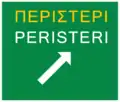 Motorway exit
Motorway exit Direction to airport
Direction to airport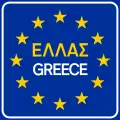 Sign used when entering Greece from other country
Sign used when entering Greece from other country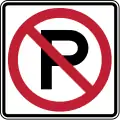 No parking
No parking Pedestrian cross direction sign
Pedestrian cross direction sign Direction arrow
Direction arrow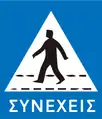 Continuous pedestrian crossings
Continuous pedestrian crossings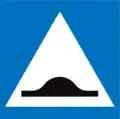 Speed bump
Speed bump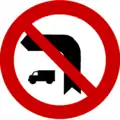 No lorries turning left
No lorries turning left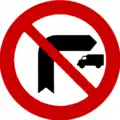 No lorries turning right
No lorries turning right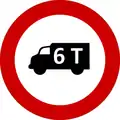 Lorries over 6 tones are prohibited to enter the road
Lorries over 6 tones are prohibited to enter the road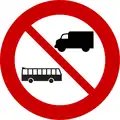 Lorries and buses are prohibited to enter the road
Lorries and buses are prohibited to enter the road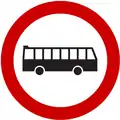 Buses are prohibited to enter the road
Buses are prohibited to enter the road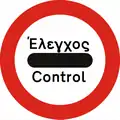 Passing without stopping prohibited (control)
Passing without stopping prohibited (control) Regulatory sign of reserved lane for lorries
Regulatory sign of reserved lane for lorries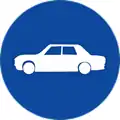 Regulatory sign of reserved lane for cars
Regulatory sign of reserved lane for cars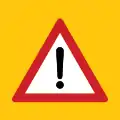 Other dangers (temporary)
Other dangers (temporary)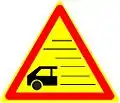 Fog likely (Alternative)
Fog likely (Alternative) No parking
No parking
Bus Service road signs for prohibiting parking on bus route narrow turning points
 "No parking. Bus passing". Athens Urban Transport Servive (OASA) and Thermal Bus Company (ETHEL) road sign.
"No parking. Bus passing". Athens Urban Transport Servive (OASA) and Thermal Bus Company (ETHEL) road sign. "No parking. Bus passing". Athens Urban Transport Servive (OASA) and Thermal Bus Company (ETHEL) road sign.
"No parking. Bus passing". Athens Urban Transport Servive (OASA) and Thermal Bus Company (ETHEL) road sign. "Bus passing. Illegally parked vehicles will be towed". Athens Urban Transport Servive (OASA) and Thermal Bus Company (ETHEL) new road sign.
"Bus passing. Illegally parked vehicles will be towed". Athens Urban Transport Servive (OASA) and Thermal Bus Company (ETHEL) new road sign.
Bus route guidance road signs
 Left arrow - Athens Urban Transport Servive (OASA) guidance sign (with route label).
Left arrow - Athens Urban Transport Servive (OASA) guidance sign (with route label). Forward arrow - Athens Urban Transoport Servive (OASA) guidance (without route label).
Forward arrow - Athens Urban Transoport Servive (OASA) guidance (without route label). Right arrow - Athens Urban Transoport Servive (OASA) guidance (without route label).
Right arrow - Athens Urban Transoport Servive (OASA) guidance (without route label).
Bus stop signs
 Old Athens bus stop sign (OASA-ETHEL) circa 1994-2005.
Old Athens bus stop sign (OASA-ETHEL) circa 1994-2005. Recent Athens bus stop sign (OASA-ETHEL) circa 2005-2015.
Recent Athens bus stop sign (OASA-ETHEL) circa 2005-2015. Most recent Athens bus stop sign (OASA-OSY) since 2015 circa.
Most recent Athens bus stop sign (OASA-OSY) since 2015 circa.
Retired signs (no longer in use)
Below, signs are withdrawn or replaced with new diagrams of the same meaning.
Other marks[16]
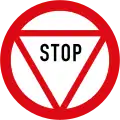 Stopping is obligatory (Stop)
Stopping is obligatory (Stop)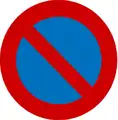 Stopping
Stopping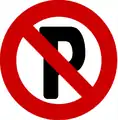 Parking
Parking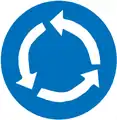 Course like arrows
Course like arrows Course like arrows
Course like arrows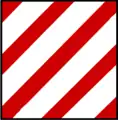 Progressive load indications
Progressive load indications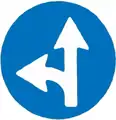 Course like arrows
Course like arrows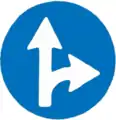 Course like arrows
Course like arrows Course like arrow
Course like arrow Mandatory bicycle space
Mandatory bicycle space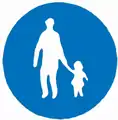 Traffic area exclusively by pedestrians
Traffic area exclusively by pedestrians Obligatory run of the depicted vehicle
Obligatory run of the depicted vehicle
Useful indications[16]
 Parking lot
Parking lot Gasoline or diesel oil
Gasoline or diesel oil Phone
Phone Attention to the forest. The Greek text says "Fire hazard"
Attention to the forest. The Greek text says "Fire hazard" Parking lot for caravans
Parking lot for caravans Hospital
Hospital First aid
First aid Workshop
Workshop Camping site
Camping site Special directional & distance sign for the vehicle shown in white space
Special directional & distance sign for the vehicle shown in white space
Warning signs[17][18]
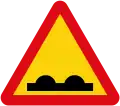 Pavement with abnormalities
Pavement with abnormalities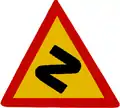 Dangerous continuous curves
Dangerous continuous curves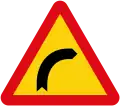 Right curne
Right curne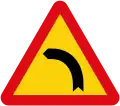 Left curve
Left curve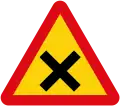 Non-priority cross-junction
Non-priority cross-junction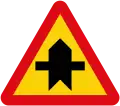 Cross-junction with moving priority as the arrow
Cross-junction with moving priority as the arrow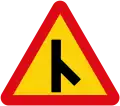 Cross-junction with moving priority as the arrow
Cross-junction with moving priority as the arrow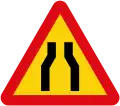 Narrow road
Narrow road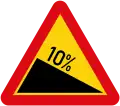 Slope (Αmount indicted)
Slope (Αmount indicted)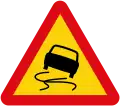 Slippery road
Slippery road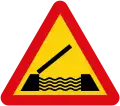 Swing bridge
Swing bridge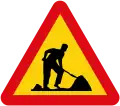 Works on the road
Works on the road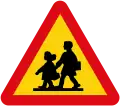 School
School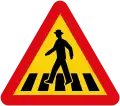 Pedestrian crossing
Pedestrian crossing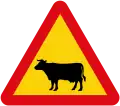 Animal passage
Animal passage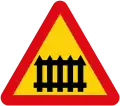 Level crossing is guarded
Level crossing is guarded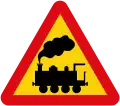 Level crossing is unguarded
Level crossing is unguarded Alert for unguarded level crossing
Alert for unguarded level crossing Alert for level crossing distance
Alert for level crossing distance Alert for level crossing distance
Alert for level crossing distance Alert for level crossing distance (These signs were placed under the signs for the level crossings)
Alert for level crossing distance (These signs were placed under the signs for the level crossings)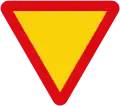 Approach to a road where the vehicles on it have priority. (Yield)
Approach to a road where the vehicles on it have priority. (Yield)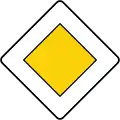 Priority road sign
Priority road sign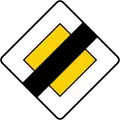 Priority expiration sign
Priority expiration sign
Temporarily retained signs (1974-1978).[19]
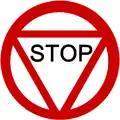 Pd-2 - Mandatory stopping of the route (STOP) with the expressive importance of P-2.
Pd-2 - Mandatory stopping of the route (STOP) with the expressive importance of P-2.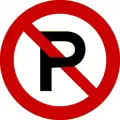 Pd - 4 No parking with the expressive importance of R-39
Pd - 4 No parking with the expressive importance of R-39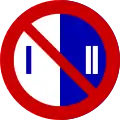 Pd-5 Parking is prohibited on the side of the sign during the odd months with the prominent significance of P-41
Pd-5 Parking is prohibited on the side of the sign during the odd months with the prominent significance of P-41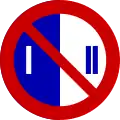 Pd- 6 Parking is prohibited on the side of the sign, in the even months with the declarative significance of the P-42
Pd- 6 Parking is prohibited on the side of the sign, in the even months with the declarative significance of the P-42
Regulatory[20]
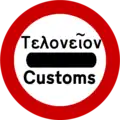 No passing without stopping before the customs - By the word "Τελωνεῖον"
No passing without stopping before the customs - By the word "Τελωνεῖον"
Old motorway signs with blue background[21]
 Motorway (Blue background)
Motorway (Blue background) End of motorway (Blue background)
End of motorway (Blue background)
References
- "Πρότυπα σήμανσης και εξοπλισμού οδών" (PDF). Ενημερωτικό δελτίου Τ.Ε.Ε. (in Greek) (Τεύχος 1980). 14 November 1997.
- "Πρότυπα σήμανσης και εξοπλισμού οδών" (PDF). Ενημερωτικό δελτίου Τ.Ε.Ε. (in Greek) (Τεύχος 1980). 14 November 1997.
- "Σήμανση οδών" (PDF) (in Greek).
- "ΕΛΠΑ - Ελληνική Λέσχη Αυτοκινήτου και Περιηγήσεων" (in Greek). 2014-07-07. Archived from the original on 2014-07-07. Retrieved 2019-09-17.
- "Σήμανση οδών" (PDF) (in Greek).
- ΛΑΓΓΙΩΤΗΣ, ΧΡ.; ΞΕΠΑΠΑΔΑΚΟΣ, ΔΗΜ. (28 January 1976). ΛΑΓΓΙΩΤΗΣ, ΧΡΙΣΤΟΔ. (ed.). "ΠΡΟΔΙΑΓΡΑΦΗ ΠΟΙΟΤΗΤΟΣ ΜΗ ΑΝΤΑΝΑΚΛΑΣΤΙΚΩΝ ΠΙΝΑΚΙΔΩΝ ΕΞ ΑΛΟΥΜΙΝΙΟΥ, ΔΙΑ ΤΗΝ ΣΗΜΑΝΣΙΝ ΟΔΩΝ". ΕΦΙΜΕΡΙΣ ΤΗΣ ΚΥΒΕΡΝΗΣΕΩΣ ΤΗΣ ΕΛΛΗΝΙΚΗΣ ΔΗΜΟΚΡΑΤΙΑΣ (in Greek). ΕΝ ΑΘΗΝΑΙΣ (ΦΕΚ 99/Β).
- ΠΑΠΑΚΡΙΘΟΠΟΥΛΟΣ, ΙΔ. (1980-04-22). ΕΦΙΜΕΡΙΣ ΤΗΣ ΚΥΒΕΡΝΗΣΕΩΣ (in Greek). Αθήναι (ΦΕΚ 1061 Β΄/1980). Missing or empty
|title=(help) - Τσανακτσίδης, Δημήτριος; Τσιτσούλας, Δημήτριος. "Σήμανση οδών" (PDF) (in Greek).
- "Σήματα ΚΟΚ". TestKOK.gr (in Greek). Retrieved 2019-06-09.
- www.autotriti.gr. "Νέα πινακίδα του Κ.Ο.Κ. για την ομίχλη". autotriti.gr (in Greek). Retrieved 2020-10-17.
- DrD (2018-04-10). "Τροποποίηση του Κ.Ο.Κ. νέες πινακίδες κατακόρυφης σήμανσης". www.drivenews.gr (in Greek). Retrieved 2020-08-15.
- Κώδικας Οδικής Κυκλοφορίας - Κ.Ο.Κ. - άτυπη κωδικοποίηση (PDF) (in Greek). iNomoi. February 2012.
- "Κώδικας-Οδικής-Κυκλοφορίας.pdf ministryofjustice.gr" (PDF) (in Greek). ΙΣΟΚΡΑΤΗΣ ΤΡΑΠΕΖΑ ΝΟΜΙΚΩΝ ΠΛΗΡΟΦΟΡΙΩΝ ΔΣΑ.
- Agenta "Έσπερος" (in Greek). 1965.
- Μάθε νά κυκλοφορῆς (PDF) (in Greek). ΑΘΗΝΑΙ: BP Greece, Υπουργείον Μεταφορών. 1962. p. 39.
- Μάθε νά κυκλοφορῆς (PDF) (in Greek). ΑΘΗΝΑΙ: BP Greece, Υπουργείον Μεταφορών. 1962. p. 89.
- Μάθε νά κυκλοφορῆς (PDF) (in Greek). ΑΘΗΝΑΙ: BP Hellas, Υπουργείον Συγκοινωνιών. 1963. p. 91.
- Μάθε νά κυκλοφορῆς (PDF) (in Greek). ΑΘΗΝΑΙ: BP Greece, Υπουργείον Μεταφορών. 1962. p. 93.
- ΦΕΚ 676 (in Greek). 1974. p. 5201.
- ΦΕΚ 676 (in Greek). 1974. p. 5193.
- Ερώτηση 10, Φύλλο #8 από τα "Φύλλα ερωτήσεων διά τήν εξέτασιν υποψηφίων οδηγών αυτοκινήτων - μοτοσυκλετών και μοτοποδηλάτων" (in Greek). Υπουργείον Συγκοινωνιών, Γεν. Δ/νσις Μεταφορών, Εκτύπωσις: Οικονόμου. 1976.
- Hellenic Road Police
- testkok.gr
